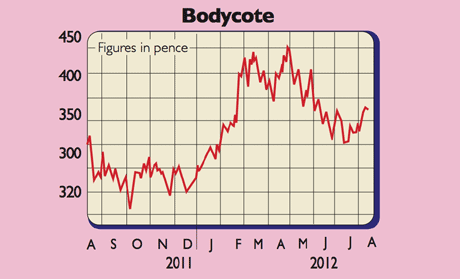Get the latest financial news, insights and expert analysis from our award-winning MoneyWeek team, to help you understand what really matters when it comes to your finances.
You are now subscribed
Your newsletter sign-up was successful
Want to add more newsletters?

Twice daily
MoneyWeek
Get the latest financial news, insights and expert analysis from our award-winning MoneyWeek team, to help you understand what really matters when it comes to your finances.

Four times a week
Look After My Bills
Sign up to our free money-saving newsletter, filled with the latest news and expert advice to help you find the best tips and deals for managing your bills. Start saving today!
At last month's Farnborough air show, Boeing predicted that, over the next two decades, the world aircraft fleet would double in size, creating a $4.5trn market for new planes. Add in a huge existing backlog of unfulfilled orders, and prospects for companies servicing this industry look bright. And that's exactly what Bodycote does.
The firm is the world's top provider of metallurgical services for the aerospace (20% of sales), automotive (26%), energy (13%) and industrial (41%) sectors. The firm heat-treats jet landing gear and engine turbine blades as well as other parts for planes, cars and power and defence systems.
Its clever thermal processing, which improves a metal's physical properties, such as corrosion resistance, hardness, density and durability, is vital for these applications. The group operates all over the world, with the largest region being Europe (60% of revenues), then North America (30%) and various emerging markets (10%).
MoneyWeek
Subscribe to MoneyWeek today and get your first six magazine issues absolutely FREE

Sign up to Money Morning
Don't miss the latest investment and personal finances news, market analysis, plus money-saving tips with our free twice-daily newsletter
Don't miss the latest investment and personal finances news, market analysis, plus money-saving tips with our free twice-daily newsletter
Bodycote is expanding rapidly in China to provide services for HGV steering components. In April, it paid £32.6m for the US heat treatment unit of Curtiss-Wright Corp, which performed ahead of expectations in the second quarter. Later this year, a new surface technology plant is set to open in Houston that will prolong the life of components used in extreme conditions (for example, oil and gas drilling and nuclear power).
Bodycote (LSE: BOY), rated a BUY by Jefferies

During the first-half year, earnings before interest, tax and amortisation (EBITA) jumped 10% on sales up 4.5% to £301.3m. Profit margins hit 15.8% thanks partly to its operational leverage. Yet the stock has suffered in the recent sell-off. This seems overdone given that the chief executive, Stephen Harris, is forecasting that second-half growth in aerospace and energy and in its newer technologies should more than offset the impact of any euro slowdown and related currency weakness.
French car manufacturers are struggling, just as Germany, Poland and the Czech Republic are beginning to slow down. However, the industry's long-term fundamentals remain intact, and the firm has coped with previous slumps.
The City is pencilling in 2012 turnover and underlying earnings per share (EPS) of £600m and 35.1p respectively, climbing to £627m and 38.2p in 2013. That puts the stock on an attractive price/earnings (p/e)ratio of ten, and a yield of 3.1%, more than three times covered. I value the group on a ten times EBITA multiple, which, after adjusting for net debt of £16.7m and a £15.3m pension deficit, delivers an intrinsic worth of about 460p per share.
That suggests there's plenty of upside on offer. Bodycote might even receive another takeover approach, following its rejection of an offer of 346p from Swiss engineer Sulzer in 2007. Jefferies has a target price of 485p.
Paul Hill also writes a weekly share-tipping newsletter, Precision Guided Investments. See www.moneyweek.com/PGI or phone 020-7633 3634 for more.
Get the latest financial news, insights and expert analysis from our award-winning MoneyWeek team, to help you understand what really matters when it comes to your finances.
Paul gained a degree in electrical engineering and went on to qualify as a chartered management accountant. He has extensive corporate finance and investment experience and is a member of the Securities Institute.
Over the past 16 years Paul has held top-level financial management and M&A roles for blue-chip companies such as O2, GKN and Unilever. He is now director of his own capital investment and consultancy firm, PMH Capital Limited.
Paul is an expert at analysing companies in new, fast-growing markets, and is an extremely shrewd stock-picker.
-
 Average income tax by area: The parts of the UK paying the most tax mapped
Average income tax by area: The parts of the UK paying the most tax mappedThe UK’s total income tax bill was £240.7 billion 2022/23, but the tax burden is not spread equally around the country. We look at the towns and boroughs that have the highest average income tax bill.
-
 BBC TV licence fee hike confirmed: can you reduce how much you pay?
BBC TV licence fee hike confirmed: can you reduce how much you pay?The cost of a TV licence fee is set to rise by over 3%, but there are ways to reduce the bill.